Organisational Behaviour Report: BBC Culture, Power, Teams
VerifiedAdded on 2020/10/22
|14
|4423
|315
Report
AI Summary
This report provides an in-depth analysis of organisational behaviour within the BBC, examining how culture, power, and political behaviour impact staff. It explores Handy's model of organisational culture, French and Raven's theory of power, and the effects of organisational politics. The report also investigates motivation, discussing content and process theories, including Maslow's hierarchy of needs and cognitive evaluation theory, to improve employee motivation and achieve organisational goals. Additionally, it identifies different types of teams, such as functional and cross-functional teams, and examines factors that contribute to team effectiveness, including the Path-Goal Theory to enhance team performance and productivity. The analysis offers insights into how the BBC can improve its organisational structure and employee performance.
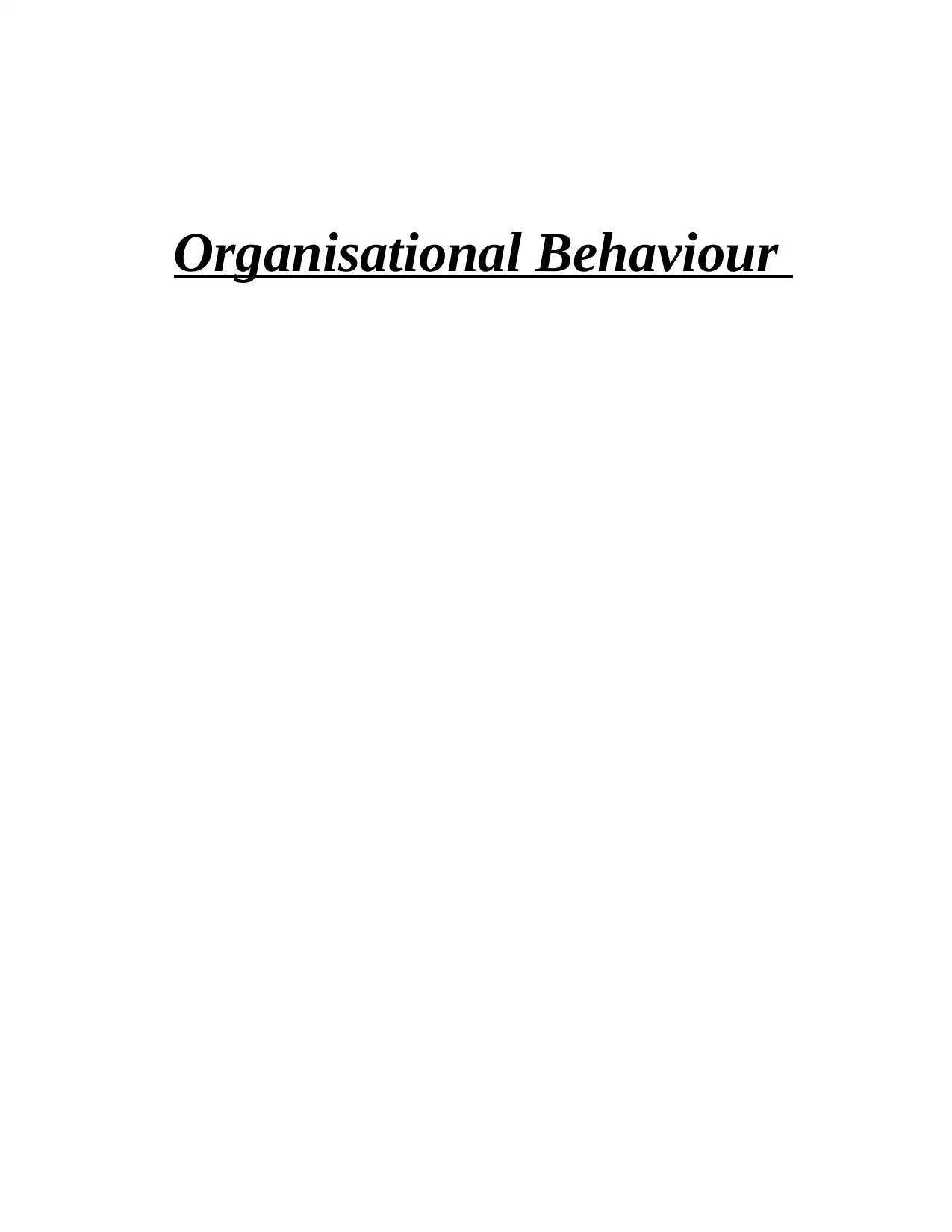
Organisational Behaviour
Paraphrase This Document
Need a fresh take? Get an instant paraphrase of this document with our AI Paraphraser
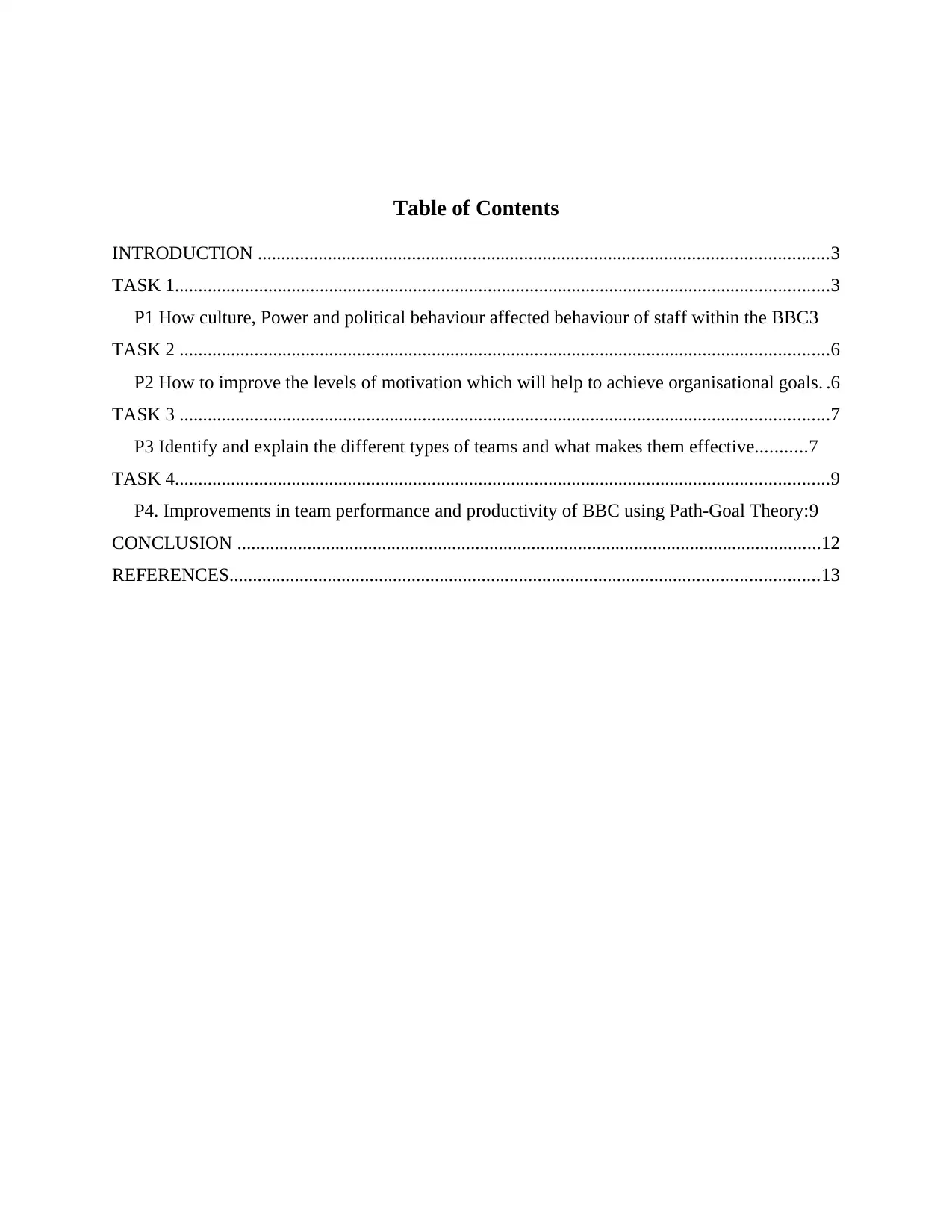
Table of Contents
INTRODUCTION ..........................................................................................................................3
TASK 1............................................................................................................................................3
P1 How culture, Power and political behaviour affected behaviour of staff within the BBC3
TASK 2 ...........................................................................................................................................6
P2 How to improve the levels of motivation which will help to achieve organisational goals. .6
TASK 3 ...........................................................................................................................................7
P3 Identify and explain the different types of teams and what makes them effective...........7
TASK 4............................................................................................................................................9
P4. Improvements in team performance and productivity of BBC using Path-Goal Theory:9
CONCLUSION .............................................................................................................................12
REFERENCES..............................................................................................................................13
INTRODUCTION ..........................................................................................................................3
TASK 1............................................................................................................................................3
P1 How culture, Power and political behaviour affected behaviour of staff within the BBC3
TASK 2 ...........................................................................................................................................6
P2 How to improve the levels of motivation which will help to achieve organisational goals. .6
TASK 3 ...........................................................................................................................................7
P3 Identify and explain the different types of teams and what makes them effective...........7
TASK 4............................................................................................................................................9
P4. Improvements in team performance and productivity of BBC using Path-Goal Theory:9
CONCLUSION .............................................................................................................................12
REFERENCES..............................................................................................................................13
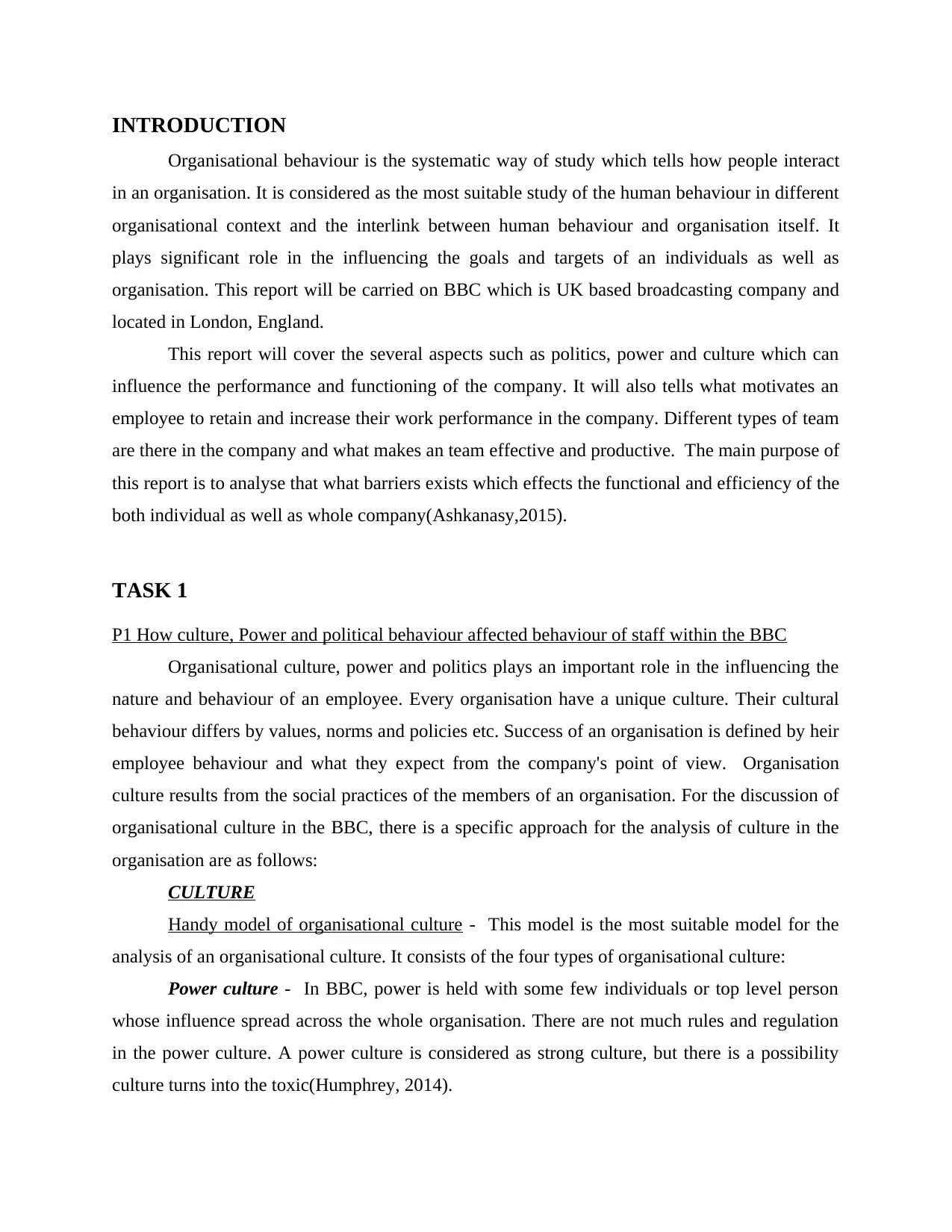
INTRODUCTION
Organisational behaviour is the systematic way of study which tells how people interact
in an organisation. It is considered as the most suitable study of the human behaviour in different
organisational context and the interlink between human behaviour and organisation itself. It
plays significant role in the influencing the goals and targets of an individuals as well as
organisation. This report will be carried on BBC which is UK based broadcasting company and
located in London, England.
This report will cover the several aspects such as politics, power and culture which can
influence the performance and functioning of the company. It will also tells what motivates an
employee to retain and increase their work performance in the company. Different types of team
are there in the company and what makes an team effective and productive. The main purpose of
this report is to analyse that what barriers exists which effects the functional and efficiency of the
both individual as well as whole company(Ashkanasy,2015).
TASK 1
P1 How culture, Power and political behaviour affected behaviour of staff within the BBC
Organisational culture, power and politics plays an important role in the influencing the
nature and behaviour of an employee. Every organisation have a unique culture. Their cultural
behaviour differs by values, norms and policies etc. Success of an organisation is defined by heir
employee behaviour and what they expect from the company's point of view. Organisation
culture results from the social practices of the members of an organisation. For the discussion of
organisational culture in the BBC, there is a specific approach for the analysis of culture in the
organisation are as follows:
CULTURE
Handy model of organisational culture - This model is the most suitable model for the
analysis of an organisational culture. It consists of the four types of organisational culture:
Power culture - In BBC, power is held with some few individuals or top level person
whose influence spread across the whole organisation. There are not much rules and regulation
in the power culture. A power culture is considered as strong culture, but there is a possibility
culture turns into the toxic(Humphrey, 2014).
Organisational behaviour is the systematic way of study which tells how people interact
in an organisation. It is considered as the most suitable study of the human behaviour in different
organisational context and the interlink between human behaviour and organisation itself. It
plays significant role in the influencing the goals and targets of an individuals as well as
organisation. This report will be carried on BBC which is UK based broadcasting company and
located in London, England.
This report will cover the several aspects such as politics, power and culture which can
influence the performance and functioning of the company. It will also tells what motivates an
employee to retain and increase their work performance in the company. Different types of team
are there in the company and what makes an team effective and productive. The main purpose of
this report is to analyse that what barriers exists which effects the functional and efficiency of the
both individual as well as whole company(Ashkanasy,2015).
TASK 1
P1 How culture, Power and political behaviour affected behaviour of staff within the BBC
Organisational culture, power and politics plays an important role in the influencing the
nature and behaviour of an employee. Every organisation have a unique culture. Their cultural
behaviour differs by values, norms and policies etc. Success of an organisation is defined by heir
employee behaviour and what they expect from the company's point of view. Organisation
culture results from the social practices of the members of an organisation. For the discussion of
organisational culture in the BBC, there is a specific approach for the analysis of culture in the
organisation are as follows:
CULTURE
Handy model of organisational culture - This model is the most suitable model for the
analysis of an organisational culture. It consists of the four types of organisational culture:
Power culture - In BBC, power is held with some few individuals or top level person
whose influence spread across the whole organisation. There are not much rules and regulation
in the power culture. A power culture is considered as strong culture, but there is a possibility
culture turns into the toxic(Humphrey, 2014).
⊘ This is a preview!⊘
Do you want full access?
Subscribe today to unlock all pages.

Trusted by 1+ million students worldwide
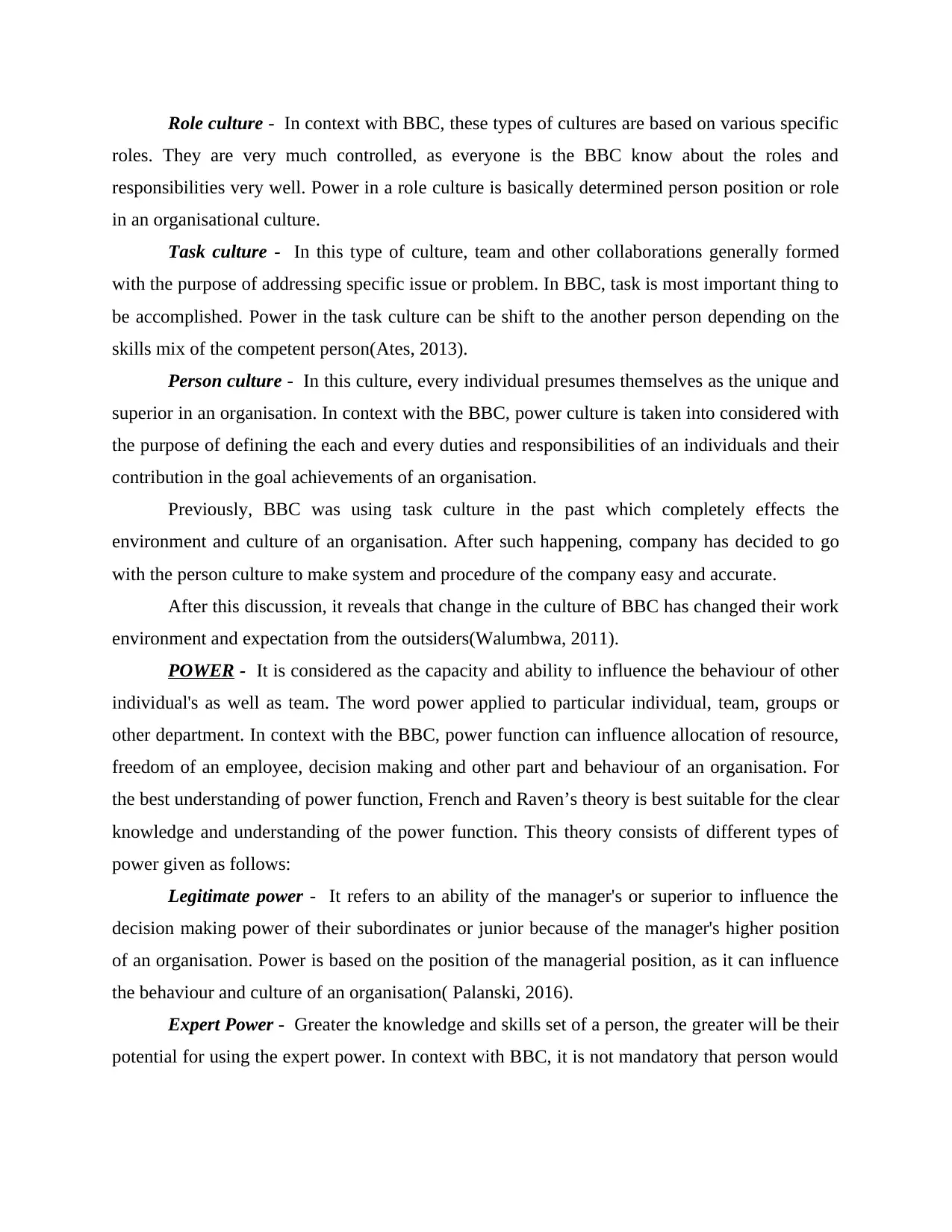
Role culture - In context with BBC, these types of cultures are based on various specific
roles. They are very much controlled, as everyone is the BBC know about the roles and
responsibilities very well. Power in a role culture is basically determined person position or role
in an organisational culture.
Task culture - In this type of culture, team and other collaborations generally formed
with the purpose of addressing specific issue or problem. In BBC, task is most important thing to
be accomplished. Power in the task culture can be shift to the another person depending on the
skills mix of the competent person(Ates, 2013).
Person culture - In this culture, every individual presumes themselves as the unique and
superior in an organisation. In context with the BBC, power culture is taken into considered with
the purpose of defining the each and every duties and responsibilities of an individuals and their
contribution in the goal achievements of an organisation.
Previously, BBC was using task culture in the past which completely effects the
environment and culture of an organisation. After such happening, company has decided to go
with the person culture to make system and procedure of the company easy and accurate.
After this discussion, it reveals that change in the culture of BBC has changed their work
environment and expectation from the outsiders(Walumbwa, 2011).
POWER - It is considered as the capacity and ability to influence the behaviour of other
individual's as well as team. The word power applied to particular individual, team, groups or
other department. In context with the BBC, power function can influence allocation of resource,
freedom of an employee, decision making and other part and behaviour of an organisation. For
the best understanding of power function, French and Raven’s theory is best suitable for the clear
knowledge and understanding of the power function. This theory consists of different types of
power given as follows:
Legitimate power - It refers to an ability of the manager's or superior to influence the
decision making power of their subordinates or junior because of the manager's higher position
of an organisation. Power is based on the position of the managerial position, as it can influence
the behaviour and culture of an organisation( Palanski, 2016).
Expert Power - Greater the knowledge and skills set of a person, the greater will be their
potential for using the expert power. In context with BBC, it is not mandatory that person would
roles. They are very much controlled, as everyone is the BBC know about the roles and
responsibilities very well. Power in a role culture is basically determined person position or role
in an organisational culture.
Task culture - In this type of culture, team and other collaborations generally formed
with the purpose of addressing specific issue or problem. In BBC, task is most important thing to
be accomplished. Power in the task culture can be shift to the another person depending on the
skills mix of the competent person(Ates, 2013).
Person culture - In this culture, every individual presumes themselves as the unique and
superior in an organisation. In context with the BBC, power culture is taken into considered with
the purpose of defining the each and every duties and responsibilities of an individuals and their
contribution in the goal achievements of an organisation.
Previously, BBC was using task culture in the past which completely effects the
environment and culture of an organisation. After such happening, company has decided to go
with the person culture to make system and procedure of the company easy and accurate.
After this discussion, it reveals that change in the culture of BBC has changed their work
environment and expectation from the outsiders(Walumbwa, 2011).
POWER - It is considered as the capacity and ability to influence the behaviour of other
individual's as well as team. The word power applied to particular individual, team, groups or
other department. In context with the BBC, power function can influence allocation of resource,
freedom of an employee, decision making and other part and behaviour of an organisation. For
the best understanding of power function, French and Raven’s theory is best suitable for the clear
knowledge and understanding of the power function. This theory consists of different types of
power given as follows:
Legitimate power - It refers to an ability of the manager's or superior to influence the
decision making power of their subordinates or junior because of the manager's higher position
of an organisation. Power is based on the position of the managerial position, as it can influence
the behaviour and culture of an organisation( Palanski, 2016).
Expert Power - Greater the knowledge and skills set of a person, the greater will be their
potential for using the expert power. In context with BBC, it is not mandatory that person would
Paraphrase This Document
Need a fresh take? Get an instant paraphrase of this document with our AI Paraphraser
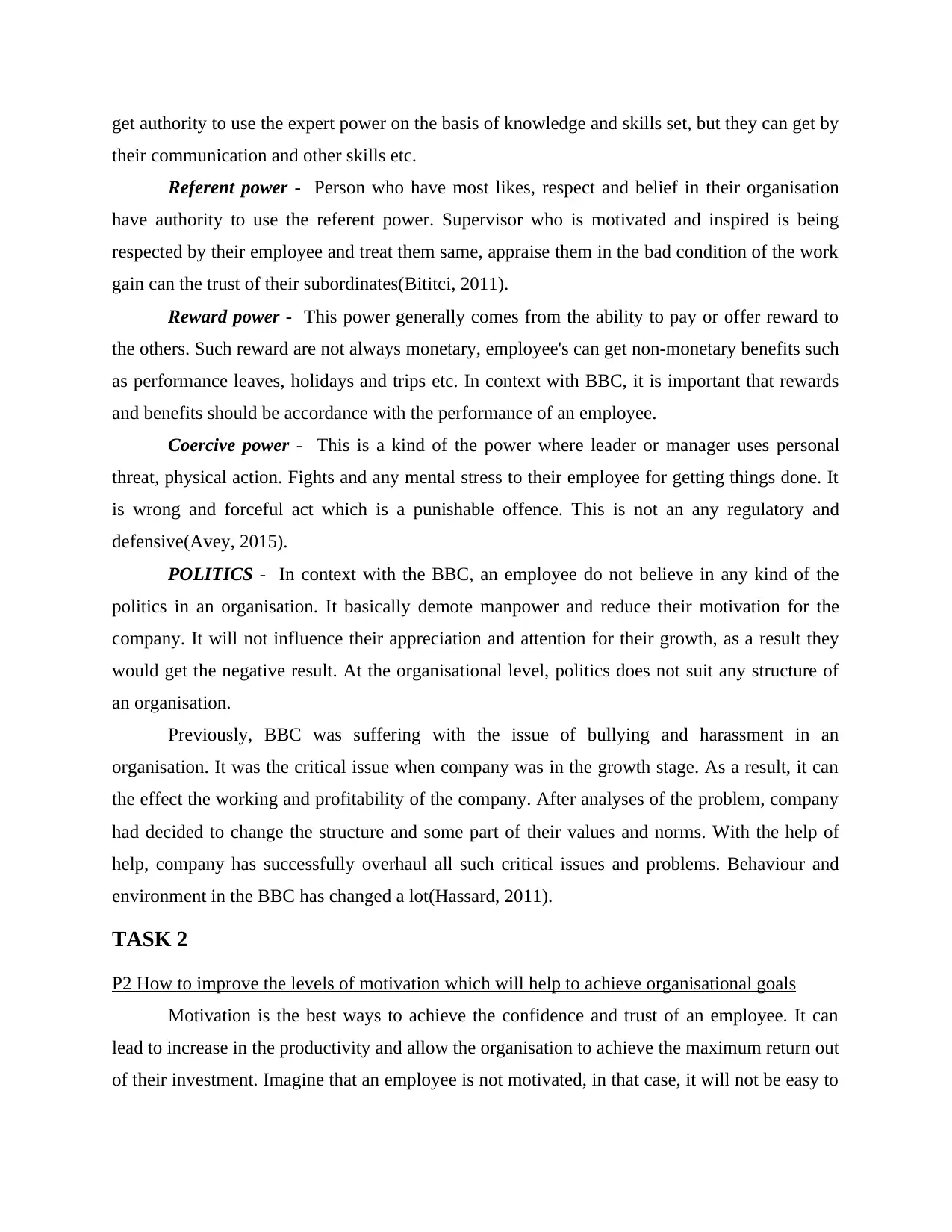
get authority to use the expert power on the basis of knowledge and skills set, but they can get by
their communication and other skills etc.
Referent power - Person who have most likes, respect and belief in their organisation
have authority to use the referent power. Supervisor who is motivated and inspired is being
respected by their employee and treat them same, appraise them in the bad condition of the work
gain can the trust of their subordinates(Bititci, 2011).
Reward power - This power generally comes from the ability to pay or offer reward to
the others. Such reward are not always monetary, employee's can get non-monetary benefits such
as performance leaves, holidays and trips etc. In context with BBC, it is important that rewards
and benefits should be accordance with the performance of an employee.
Coercive power - This is a kind of the power where leader or manager uses personal
threat, physical action. Fights and any mental stress to their employee for getting things done. It
is wrong and forceful act which is a punishable offence. This is not an any regulatory and
defensive(Avey, 2015).
POLITICS - In context with the BBC, an employee do not believe in any kind of the
politics in an organisation. It basically demote manpower and reduce their motivation for the
company. It will not influence their appreciation and attention for their growth, as a result they
would get the negative result. At the organisational level, politics does not suit any structure of
an organisation.
Previously, BBC was suffering with the issue of bullying and harassment in an
organisation. It was the critical issue when company was in the growth stage. As a result, it can
the effect the working and profitability of the company. After analyses of the problem, company
had decided to change the structure and some part of their values and norms. With the help of
help, company has successfully overhaul all such critical issues and problems. Behaviour and
environment in the BBC has changed a lot(Hassard, 2011).
TASK 2
P2 How to improve the levels of motivation which will help to achieve organisational goals
Motivation is the best ways to achieve the confidence and trust of an employee. It can
lead to increase in the productivity and allow the organisation to achieve the maximum return out
of their investment. Imagine that an employee is not motivated, in that case, it will not be easy to
their communication and other skills etc.
Referent power - Person who have most likes, respect and belief in their organisation
have authority to use the referent power. Supervisor who is motivated and inspired is being
respected by their employee and treat them same, appraise them in the bad condition of the work
gain can the trust of their subordinates(Bititci, 2011).
Reward power - This power generally comes from the ability to pay or offer reward to
the others. Such reward are not always monetary, employee's can get non-monetary benefits such
as performance leaves, holidays and trips etc. In context with BBC, it is important that rewards
and benefits should be accordance with the performance of an employee.
Coercive power - This is a kind of the power where leader or manager uses personal
threat, physical action. Fights and any mental stress to their employee for getting things done. It
is wrong and forceful act which is a punishable offence. This is not an any regulatory and
defensive(Avey, 2015).
POLITICS - In context with the BBC, an employee do not believe in any kind of the
politics in an organisation. It basically demote manpower and reduce their motivation for the
company. It will not influence their appreciation and attention for their growth, as a result they
would get the negative result. At the organisational level, politics does not suit any structure of
an organisation.
Previously, BBC was suffering with the issue of bullying and harassment in an
organisation. It was the critical issue when company was in the growth stage. As a result, it can
the effect the working and profitability of the company. After analyses of the problem, company
had decided to change the structure and some part of their values and norms. With the help of
help, company has successfully overhaul all such critical issues and problems. Behaviour and
environment in the BBC has changed a lot(Hassard, 2011).
TASK 2
P2 How to improve the levels of motivation which will help to achieve organisational goals
Motivation is the best ways to achieve the confidence and trust of an employee. It can
lead to increase in the productivity and allow the organisation to achieve the maximum return out
of their investment. Imagine that an employee is not motivated, in that case, it will not be easy to
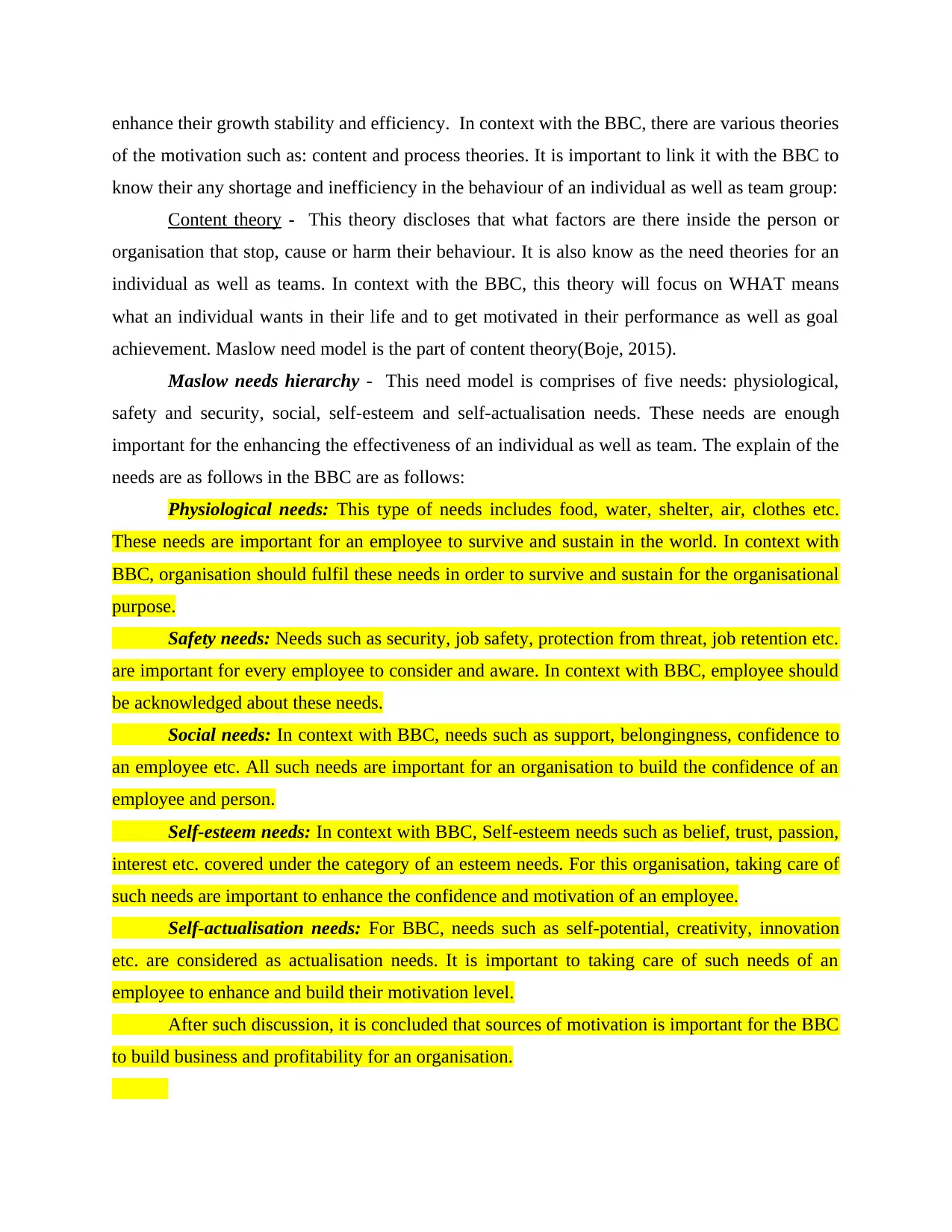
enhance their growth stability and efficiency. In context with the BBC, there are various theories
of the motivation such as: content and process theories. It is important to link it with the BBC to
know their any shortage and inefficiency in the behaviour of an individual as well as team group:
Content theory - This theory discloses that what factors are there inside the person or
organisation that stop, cause or harm their behaviour. It is also know as the need theories for an
individual as well as teams. In context with the BBC, this theory will focus on WHAT means
what an individual wants in their life and to get motivated in their performance as well as goal
achievement. Maslow need model is the part of content theory(Boje, 2015).
Maslow needs hierarchy - This need model is comprises of five needs: physiological,
safety and security, social, self-esteem and self-actualisation needs. These needs are enough
important for the enhancing the effectiveness of an individual as well as team. The explain of the
needs are as follows in the BBC are as follows:
Physiological needs: This type of needs includes food, water, shelter, air, clothes etc.
These needs are important for an employee to survive and sustain in the world. In context with
BBC, organisation should fulfil these needs in order to survive and sustain for the organisational
purpose.
Safety needs: Needs such as security, job safety, protection from threat, job retention etc.
are important for every employee to consider and aware. In context with BBC, employee should
be acknowledged about these needs.
Social needs: In context with BBC, needs such as support, belongingness, confidence to
an employee etc. All such needs are important for an organisation to build the confidence of an
employee and person.
Self-esteem needs: In context with BBC, Self-esteem needs such as belief, trust, passion,
interest etc. covered under the category of an esteem needs. For this organisation, taking care of
such needs are important to enhance the confidence and motivation of an employee.
Self-actualisation needs: For BBC, needs such as self-potential, creativity, innovation
etc. are considered as actualisation needs. It is important to taking care of such needs of an
employee to enhance and build their motivation level.
After such discussion, it is concluded that sources of motivation is important for the BBC
to build business and profitability for an organisation.
of the motivation such as: content and process theories. It is important to link it with the BBC to
know their any shortage and inefficiency in the behaviour of an individual as well as team group:
Content theory - This theory discloses that what factors are there inside the person or
organisation that stop, cause or harm their behaviour. It is also know as the need theories for an
individual as well as teams. In context with the BBC, this theory will focus on WHAT means
what an individual wants in their life and to get motivated in their performance as well as goal
achievement. Maslow need model is the part of content theory(Boje, 2015).
Maslow needs hierarchy - This need model is comprises of five needs: physiological,
safety and security, social, self-esteem and self-actualisation needs. These needs are enough
important for the enhancing the effectiveness of an individual as well as team. The explain of the
needs are as follows in the BBC are as follows:
Physiological needs: This type of needs includes food, water, shelter, air, clothes etc.
These needs are important for an employee to survive and sustain in the world. In context with
BBC, organisation should fulfil these needs in order to survive and sustain for the organisational
purpose.
Safety needs: Needs such as security, job safety, protection from threat, job retention etc.
are important for every employee to consider and aware. In context with BBC, employee should
be acknowledged about these needs.
Social needs: In context with BBC, needs such as support, belongingness, confidence to
an employee etc. All such needs are important for an organisation to build the confidence of an
employee and person.
Self-esteem needs: In context with BBC, Self-esteem needs such as belief, trust, passion,
interest etc. covered under the category of an esteem needs. For this organisation, taking care of
such needs are important to enhance the confidence and motivation of an employee.
Self-actualisation needs: For BBC, needs such as self-potential, creativity, innovation
etc. are considered as actualisation needs. It is important to taking care of such needs of an
employee to enhance and build their motivation level.
After such discussion, it is concluded that sources of motivation is important for the BBC
to build business and profitability for an organisation.
⊘ This is a preview!⊘
Do you want full access?
Subscribe today to unlock all pages.

Trusted by 1+ million students worldwide
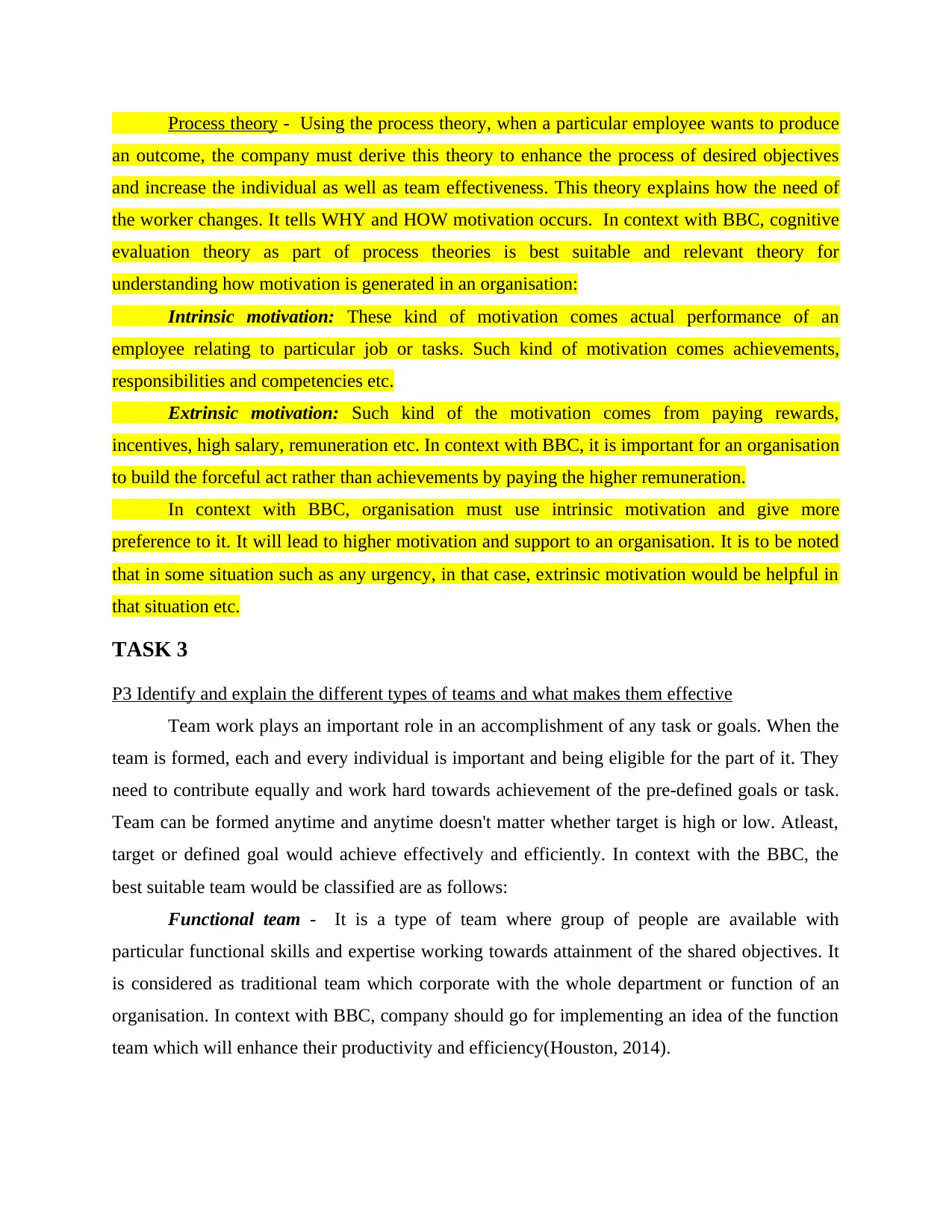
Process theory - Using the process theory, when a particular employee wants to produce
an outcome, the company must derive this theory to enhance the process of desired objectives
and increase the individual as well as team effectiveness. This theory explains how the need of
the worker changes. It tells WHY and HOW motivation occurs. In context with BBC, cognitive
evaluation theory as part of process theories is best suitable and relevant theory for
understanding how motivation is generated in an organisation:
Intrinsic motivation: These kind of motivation comes actual performance of an
employee relating to particular job or tasks. Such kind of motivation comes achievements,
responsibilities and competencies etc.
Extrinsic motivation: Such kind of the motivation comes from paying rewards,
incentives, high salary, remuneration etc. In context with BBC, it is important for an organisation
to build the forceful act rather than achievements by paying the higher remuneration.
In context with BBC, organisation must use intrinsic motivation and give more
preference to it. It will lead to higher motivation and support to an organisation. It is to be noted
that in some situation such as any urgency, in that case, extrinsic motivation would be helpful in
that situation etc.
TASK 3
P3 Identify and explain the different types of teams and what makes them effective
Team work plays an important role in an accomplishment of any task or goals. When the
team is formed, each and every individual is important and being eligible for the part of it. They
need to contribute equally and work hard towards achievement of the pre-defined goals or task.
Team can be formed anytime and anytime doesn't matter whether target is high or low. Atleast,
target or defined goal would achieve effectively and efficiently. In context with the BBC, the
best suitable team would be classified are as follows:
Functional team - It is a type of team where group of people are available with
particular functional skills and expertise working towards attainment of the shared objectives. It
is considered as traditional team which corporate with the whole department or function of an
organisation. In context with BBC, company should go for implementing an idea of the function
team which will enhance their productivity and efficiency(Houston, 2014).
an outcome, the company must derive this theory to enhance the process of desired objectives
and increase the individual as well as team effectiveness. This theory explains how the need of
the worker changes. It tells WHY and HOW motivation occurs. In context with BBC, cognitive
evaluation theory as part of process theories is best suitable and relevant theory for
understanding how motivation is generated in an organisation:
Intrinsic motivation: These kind of motivation comes actual performance of an
employee relating to particular job or tasks. Such kind of motivation comes achievements,
responsibilities and competencies etc.
Extrinsic motivation: Such kind of the motivation comes from paying rewards,
incentives, high salary, remuneration etc. In context with BBC, it is important for an organisation
to build the forceful act rather than achievements by paying the higher remuneration.
In context with BBC, organisation must use intrinsic motivation and give more
preference to it. It will lead to higher motivation and support to an organisation. It is to be noted
that in some situation such as any urgency, in that case, extrinsic motivation would be helpful in
that situation etc.
TASK 3
P3 Identify and explain the different types of teams and what makes them effective
Team work plays an important role in an accomplishment of any task or goals. When the
team is formed, each and every individual is important and being eligible for the part of it. They
need to contribute equally and work hard towards achievement of the pre-defined goals or task.
Team can be formed anytime and anytime doesn't matter whether target is high or low. Atleast,
target or defined goal would achieve effectively and efficiently. In context with the BBC, the
best suitable team would be classified are as follows:
Functional team - It is a type of team where group of people are available with
particular functional skills and expertise working towards attainment of the shared objectives. It
is considered as traditional team which corporate with the whole department or function of an
organisation. In context with BBC, company should go for implementing an idea of the function
team which will enhance their productivity and efficiency(Houston, 2014).
Paraphrase This Document
Need a fresh take? Get an instant paraphrase of this document with our AI Paraphraser
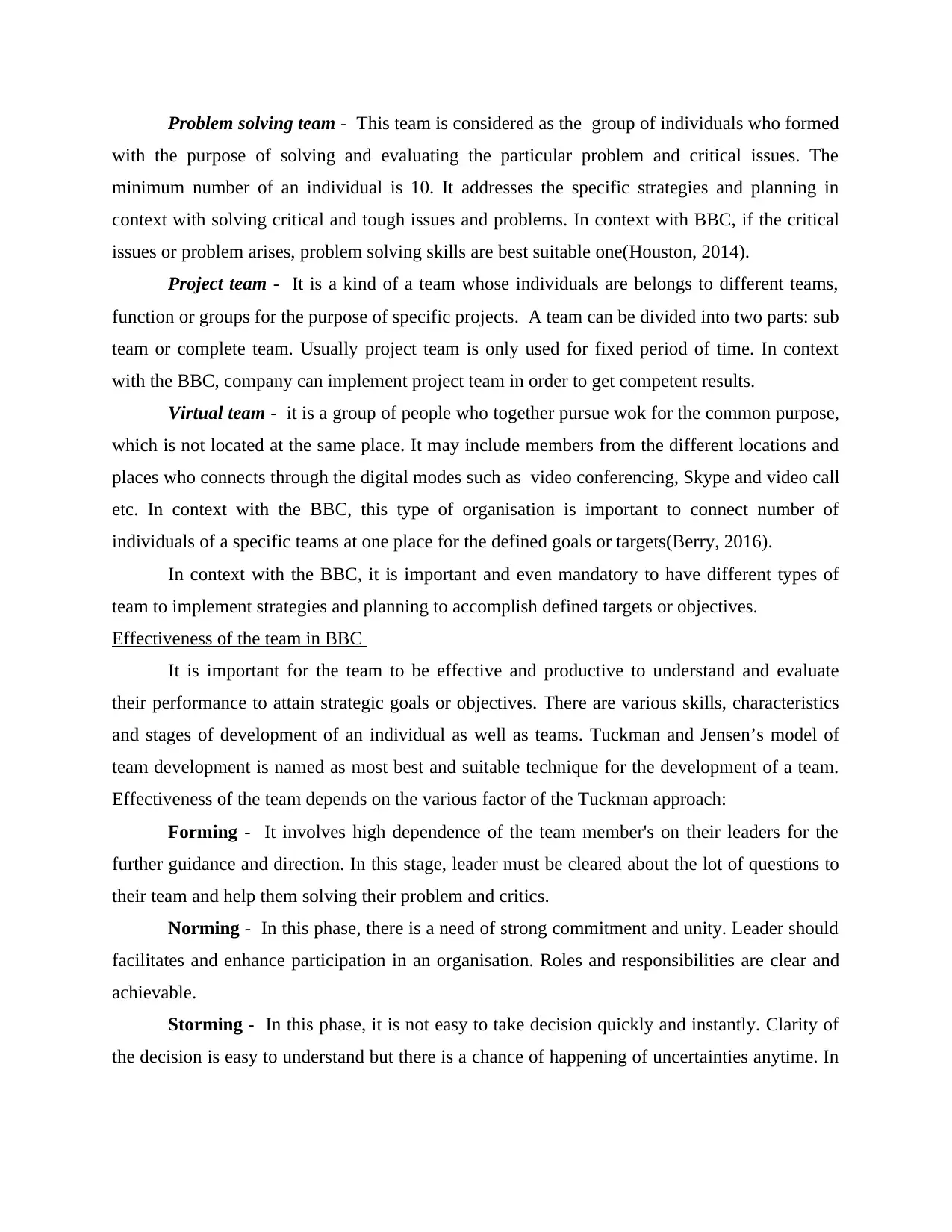
Problem solving team - This team is considered as the group of individuals who formed
with the purpose of solving and evaluating the particular problem and critical issues. The
minimum number of an individual is 10. It addresses the specific strategies and planning in
context with solving critical and tough issues and problems. In context with BBC, if the critical
issues or problem arises, problem solving skills are best suitable one(Houston, 2014).
Project team - It is a kind of a team whose individuals are belongs to different teams,
function or groups for the purpose of specific projects. A team can be divided into two parts: sub
team or complete team. Usually project team is only used for fixed period of time. In context
with the BBC, company can implement project team in order to get competent results.
Virtual team - it is a group of people who together pursue wok for the common purpose,
which is not located at the same place. It may include members from the different locations and
places who connects through the digital modes such as video conferencing, Skype and video call
etc. In context with the BBC, this type of organisation is important to connect number of
individuals of a specific teams at one place for the defined goals or targets(Berry, 2016).
In context with the BBC, it is important and even mandatory to have different types of
team to implement strategies and planning to accomplish defined targets or objectives.
Effectiveness of the team in BBC
It is important for the team to be effective and productive to understand and evaluate
their performance to attain strategic goals or objectives. There are various skills, characteristics
and stages of development of an individual as well as teams. Tuckman and Jensen’s model of
team development is named as most best and suitable technique for the development of a team.
Effectiveness of the team depends on the various factor of the Tuckman approach:
Forming - It involves high dependence of the team member's on their leaders for the
further guidance and direction. In this stage, leader must be cleared about the lot of questions to
their team and help them solving their problem and critics.
Norming - In this phase, there is a need of strong commitment and unity. Leader should
facilitates and enhance participation in an organisation. Roles and responsibilities are clear and
achievable.
Storming - In this phase, it is not easy to take decision quickly and instantly. Clarity of
the decision is easy to understand but there is a chance of happening of uncertainties anytime. In
with the purpose of solving and evaluating the particular problem and critical issues. The
minimum number of an individual is 10. It addresses the specific strategies and planning in
context with solving critical and tough issues and problems. In context with BBC, if the critical
issues or problem arises, problem solving skills are best suitable one(Houston, 2014).
Project team - It is a kind of a team whose individuals are belongs to different teams,
function or groups for the purpose of specific projects. A team can be divided into two parts: sub
team or complete team. Usually project team is only used for fixed period of time. In context
with the BBC, company can implement project team in order to get competent results.
Virtual team - it is a group of people who together pursue wok for the common purpose,
which is not located at the same place. It may include members from the different locations and
places who connects through the digital modes such as video conferencing, Skype and video call
etc. In context with the BBC, this type of organisation is important to connect number of
individuals of a specific teams at one place for the defined goals or targets(Berry, 2016).
In context with the BBC, it is important and even mandatory to have different types of
team to implement strategies and planning to accomplish defined targets or objectives.
Effectiveness of the team in BBC
It is important for the team to be effective and productive to understand and evaluate
their performance to attain strategic goals or objectives. There are various skills, characteristics
and stages of development of an individual as well as teams. Tuckman and Jensen’s model of
team development is named as most best and suitable technique for the development of a team.
Effectiveness of the team depends on the various factor of the Tuckman approach:
Forming - It involves high dependence of the team member's on their leaders for the
further guidance and direction. In this stage, leader must be cleared about the lot of questions to
their team and help them solving their problem and critics.
Norming - In this phase, there is a need of strong commitment and unity. Leader should
facilitates and enhance participation in an organisation. Roles and responsibilities are clear and
achievable.
Storming - In this phase, it is not easy to take decision quickly and instantly. Clarity of
the decision is easy to understand but there is a chance of happening of uncertainties anytime. In
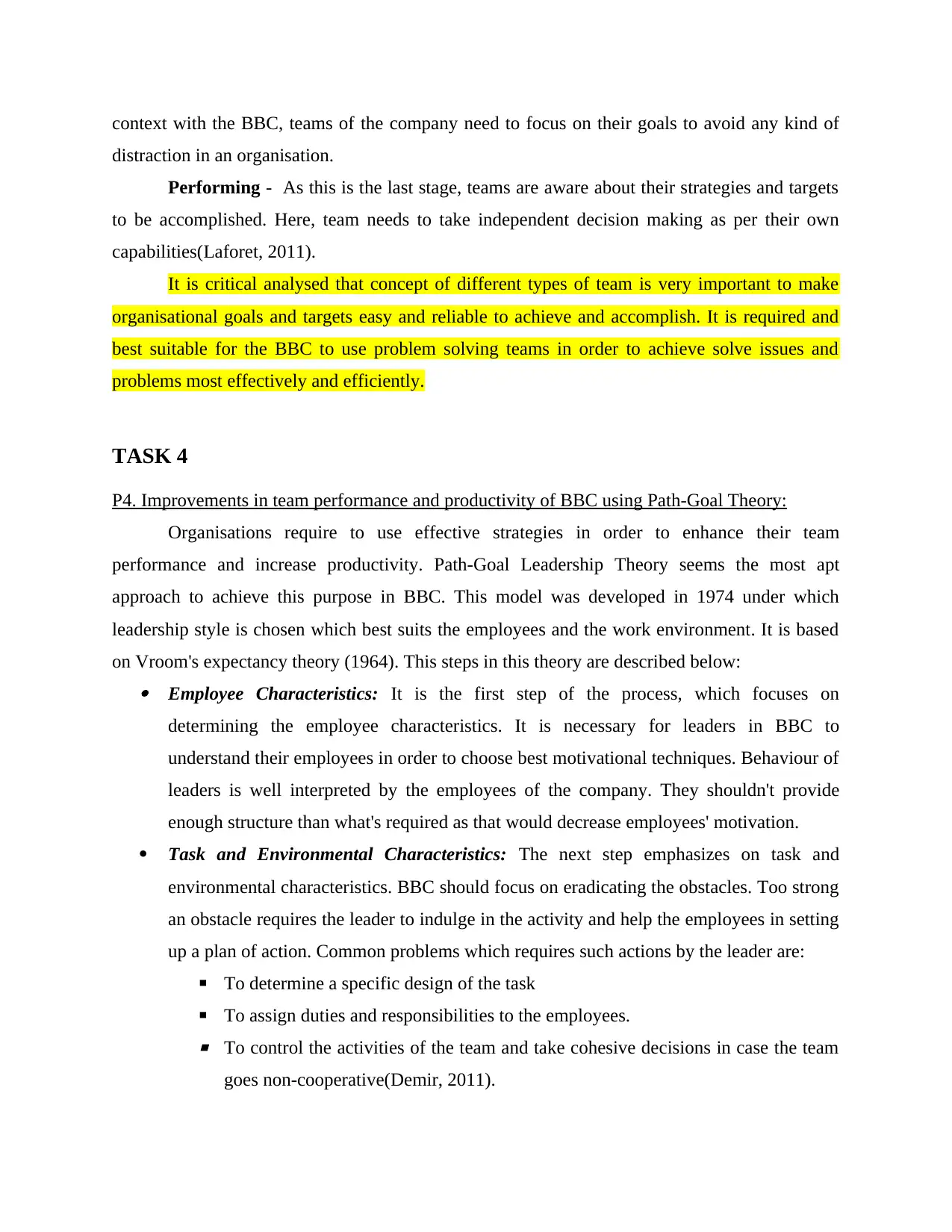
context with the BBC, teams of the company need to focus on their goals to avoid any kind of
distraction in an organisation.
Performing - As this is the last stage, teams are aware about their strategies and targets
to be accomplished. Here, team needs to take independent decision making as per their own
capabilities(Laforet, 2011).
It is critical analysed that concept of different types of team is very important to make
organisational goals and targets easy and reliable to achieve and accomplish. It is required and
best suitable for the BBC to use problem solving teams in order to achieve solve issues and
problems most effectively and efficiently.
TASK 4
P4. Improvements in team performance and productivity of BBC using Path-Goal Theory:
Organisations require to use effective strategies in order to enhance their team
performance and increase productivity. Path-Goal Leadership Theory seems the most apt
approach to achieve this purpose in BBC. This model was developed in 1974 under which
leadership style is chosen which best suits the employees and the work environment. It is based
on Vroom's expectancy theory (1964). This steps in this theory are described below: Employee Characteristics: It is the first step of the process, which focuses on
determining the employee characteristics. It is necessary for leaders in BBC to
understand their employees in order to choose best motivational techniques. Behaviour of
leaders is well interpreted by the employees of the company. They shouldn't provide
enough structure than what's required as that would decrease employees' motivation.
Task and Environmental Characteristics: The next step emphasizes on task and
environmental characteristics. BBC should focus on eradicating the obstacles. Too strong
an obstacle requires the leader to indulge in the activity and help the employees in setting
up a plan of action. Common problems which requires such actions by the leader are:
▪ To determine a specific design of the task
▪ To assign duties and responsibilities to the employees.
▪ To control the activities of the team and take cohesive decisions in case the team
goes non-cooperative(Demir, 2011).
distraction in an organisation.
Performing - As this is the last stage, teams are aware about their strategies and targets
to be accomplished. Here, team needs to take independent decision making as per their own
capabilities(Laforet, 2011).
It is critical analysed that concept of different types of team is very important to make
organisational goals and targets easy and reliable to achieve and accomplish. It is required and
best suitable for the BBC to use problem solving teams in order to achieve solve issues and
problems most effectively and efficiently.
TASK 4
P4. Improvements in team performance and productivity of BBC using Path-Goal Theory:
Organisations require to use effective strategies in order to enhance their team
performance and increase productivity. Path-Goal Leadership Theory seems the most apt
approach to achieve this purpose in BBC. This model was developed in 1974 under which
leadership style is chosen which best suits the employees and the work environment. It is based
on Vroom's expectancy theory (1964). This steps in this theory are described below: Employee Characteristics: It is the first step of the process, which focuses on
determining the employee characteristics. It is necessary for leaders in BBC to
understand their employees in order to choose best motivational techniques. Behaviour of
leaders is well interpreted by the employees of the company. They shouldn't provide
enough structure than what's required as that would decrease employees' motivation.
Task and Environmental Characteristics: The next step emphasizes on task and
environmental characteristics. BBC should focus on eradicating the obstacles. Too strong
an obstacle requires the leader to indulge in the activity and help the employees in setting
up a plan of action. Common problems which requires such actions by the leader are:
▪ To determine a specific design of the task
▪ To assign duties and responsibilities to the employees.
▪ To control the activities of the team and take cohesive decisions in case the team
goes non-cooperative(Demir, 2011).
⊘ This is a preview!⊘
Do you want full access?
Subscribe today to unlock all pages.

Trusted by 1+ million students worldwide
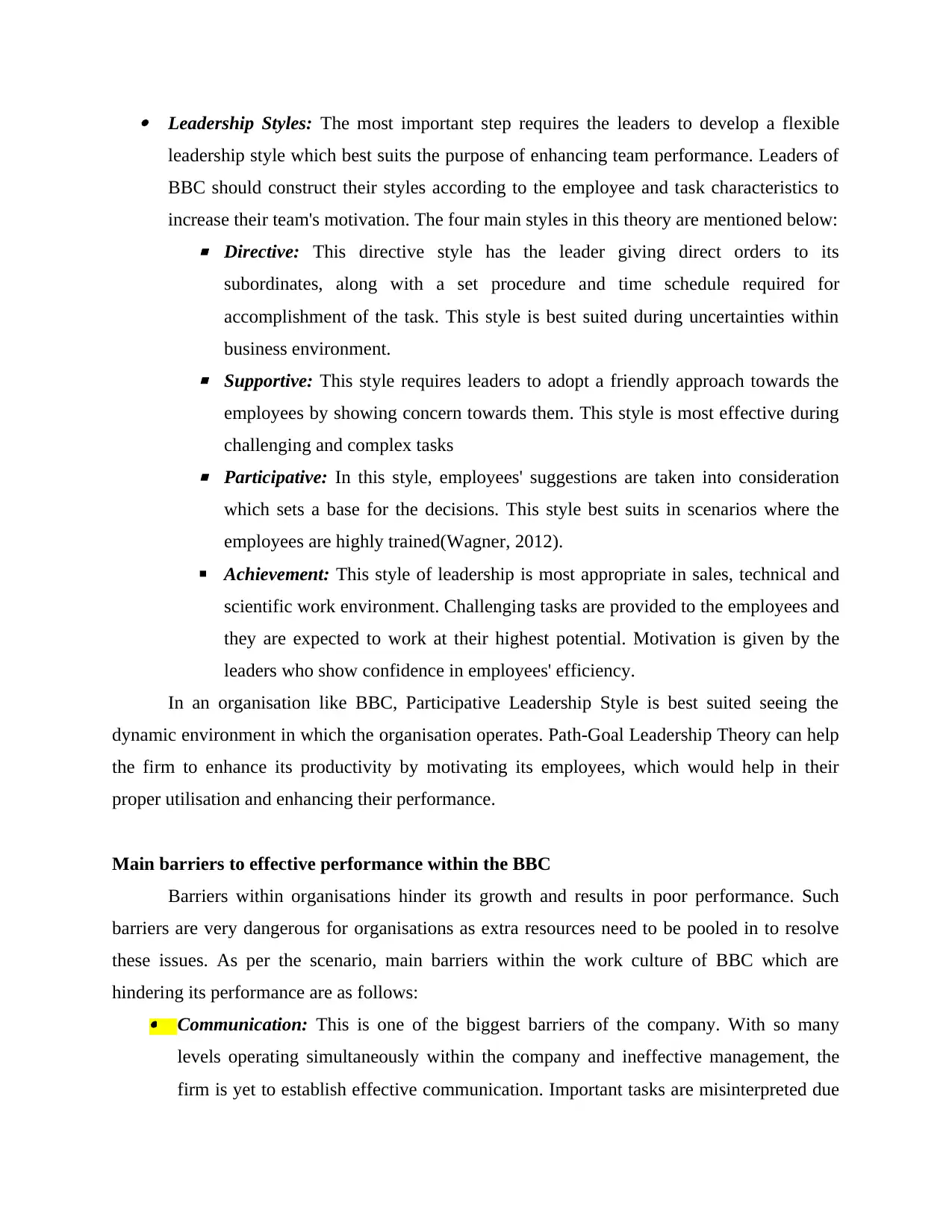
Leadership Styles: The most important step requires the leaders to develop a flexible
leadership style which best suits the purpose of enhancing team performance. Leaders of
BBC should construct their styles according to the employee and task characteristics to
increase their team's motivation. The four main styles in this theory are mentioned below:
▪ Directive: This directive style has the leader giving direct orders to its
subordinates, along with a set procedure and time schedule required for
accomplishment of the task. This style is best suited during uncertainties within
business environment.
▪ Supportive: This style requires leaders to adopt a friendly approach towards the
employees by showing concern towards them. This style is most effective during
challenging and complex tasks
▪ Participative: In this style, employees' suggestions are taken into consideration
which sets a base for the decisions. This style best suits in scenarios where the
employees are highly trained(Wagner, 2012).
▪ Achievement: This style of leadership is most appropriate in sales, technical and
scientific work environment. Challenging tasks are provided to the employees and
they are expected to work at their highest potential. Motivation is given by the
leaders who show confidence in employees' efficiency.
In an organisation like BBC, Participative Leadership Style is best suited seeing the
dynamic environment in which the organisation operates. Path-Goal Leadership Theory can help
the firm to enhance its productivity by motivating its employees, which would help in their
proper utilisation and enhancing their performance.
Main barriers to effective performance within the BBC
Barriers within organisations hinder its growth and results in poor performance. Such
barriers are very dangerous for organisations as extra resources need to be pooled in to resolve
these issues. As per the scenario, main barriers within the work culture of BBC which are
hindering its performance are as follows: Communication: This is one of the biggest barriers of the company. With so many
levels operating simultaneously within the company and ineffective management, the
firm is yet to establish effective communication. Important tasks are misinterpreted due
leadership style which best suits the purpose of enhancing team performance. Leaders of
BBC should construct their styles according to the employee and task characteristics to
increase their team's motivation. The four main styles in this theory are mentioned below:
▪ Directive: This directive style has the leader giving direct orders to its
subordinates, along with a set procedure and time schedule required for
accomplishment of the task. This style is best suited during uncertainties within
business environment.
▪ Supportive: This style requires leaders to adopt a friendly approach towards the
employees by showing concern towards them. This style is most effective during
challenging and complex tasks
▪ Participative: In this style, employees' suggestions are taken into consideration
which sets a base for the decisions. This style best suits in scenarios where the
employees are highly trained(Wagner, 2012).
▪ Achievement: This style of leadership is most appropriate in sales, technical and
scientific work environment. Challenging tasks are provided to the employees and
they are expected to work at their highest potential. Motivation is given by the
leaders who show confidence in employees' efficiency.
In an organisation like BBC, Participative Leadership Style is best suited seeing the
dynamic environment in which the organisation operates. Path-Goal Leadership Theory can help
the firm to enhance its productivity by motivating its employees, which would help in their
proper utilisation and enhancing their performance.
Main barriers to effective performance within the BBC
Barriers within organisations hinder its growth and results in poor performance. Such
barriers are very dangerous for organisations as extra resources need to be pooled in to resolve
these issues. As per the scenario, main barriers within the work culture of BBC which are
hindering its performance are as follows: Communication: This is one of the biggest barriers of the company. With so many
levels operating simultaneously within the company and ineffective management, the
firm is yet to establish effective communication. Important tasks are misinterpreted due
Paraphrase This Document
Need a fresh take? Get an instant paraphrase of this document with our AI Paraphraser
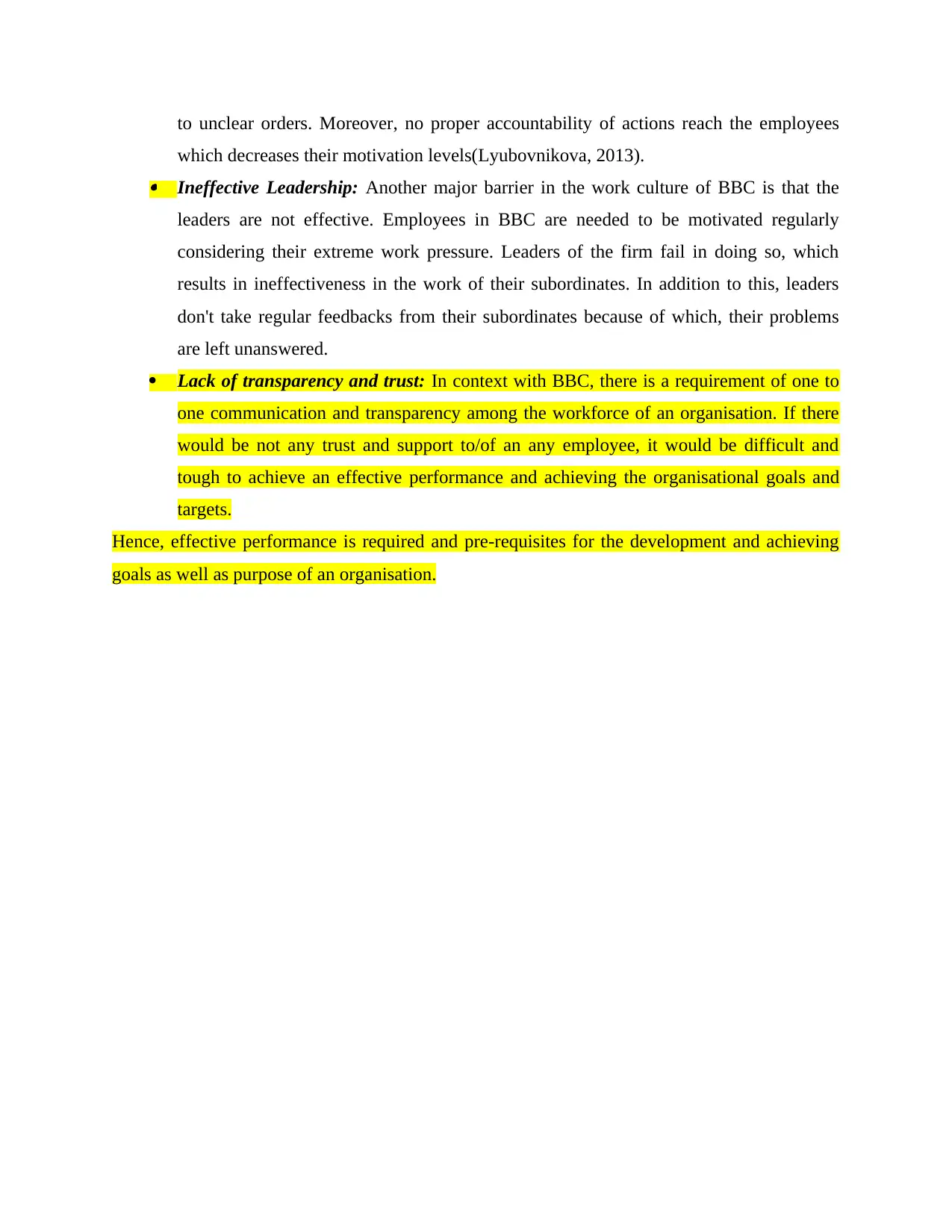
to unclear orders. Moreover, no proper accountability of actions reach the employees
which decreases their motivation levels(Lyubovnikova, 2013). Ineffective Leadership: Another major barrier in the work culture of BBC is that the
leaders are not effective. Employees in BBC are needed to be motivated regularly
considering their extreme work pressure. Leaders of the firm fail in doing so, which
results in ineffectiveness in the work of their subordinates. In addition to this, leaders
don't take regular feedbacks from their subordinates because of which, their problems
are left unanswered.
Lack of transparency and trust: In context with BBC, there is a requirement of one to
one communication and transparency among the workforce of an organisation. If there
would be not any trust and support to/of an any employee, it would be difficult and
tough to achieve an effective performance and achieving the organisational goals and
targets.
Hence, effective performance is required and pre-requisites for the development and achieving
goals as well as purpose of an organisation.
which decreases their motivation levels(Lyubovnikova, 2013). Ineffective Leadership: Another major barrier in the work culture of BBC is that the
leaders are not effective. Employees in BBC are needed to be motivated regularly
considering their extreme work pressure. Leaders of the firm fail in doing so, which
results in ineffectiveness in the work of their subordinates. In addition to this, leaders
don't take regular feedbacks from their subordinates because of which, their problems
are left unanswered.
Lack of transparency and trust: In context with BBC, there is a requirement of one to
one communication and transparency among the workforce of an organisation. If there
would be not any trust and support to/of an any employee, it would be difficult and
tough to achieve an effective performance and achieving the organisational goals and
targets.
Hence, effective performance is required and pre-requisites for the development and achieving
goals as well as purpose of an organisation.
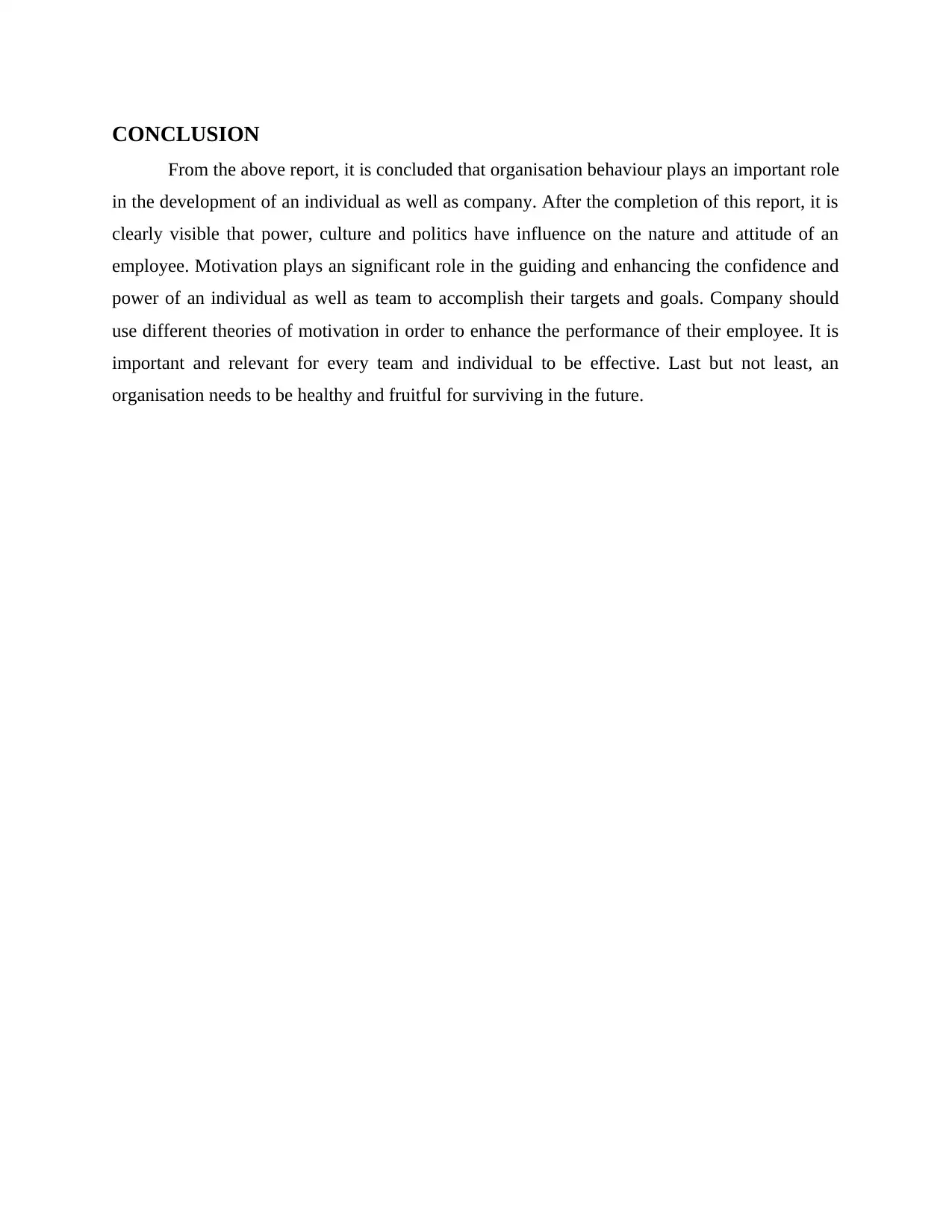
CONCLUSION
From the above report, it is concluded that organisation behaviour plays an important role
in the development of an individual as well as company. After the completion of this report, it is
clearly visible that power, culture and politics have influence on the nature and attitude of an
employee. Motivation plays an significant role in the guiding and enhancing the confidence and
power of an individual as well as team to accomplish their targets and goals. Company should
use different theories of motivation in order to enhance the performance of their employee. It is
important and relevant for every team and individual to be effective. Last but not least, an
organisation needs to be healthy and fruitful for surviving in the future.
From the above report, it is concluded that organisation behaviour plays an important role
in the development of an individual as well as company. After the completion of this report, it is
clearly visible that power, culture and politics have influence on the nature and attitude of an
employee. Motivation plays an significant role in the guiding and enhancing the confidence and
power of an individual as well as team to accomplish their targets and goals. Company should
use different theories of motivation in order to enhance the performance of their employee. It is
important and relevant for every team and individual to be effective. Last but not least, an
organisation needs to be healthy and fruitful for surviving in the future.
⊘ This is a preview!⊘
Do you want full access?
Subscribe today to unlock all pages.

Trusted by 1+ million students worldwide
1 out of 14
Related Documents
Your All-in-One AI-Powered Toolkit for Academic Success.
+13062052269
info@desklib.com
Available 24*7 on WhatsApp / Email
![[object Object]](/_next/static/media/star-bottom.7253800d.svg)
Unlock your academic potential
Copyright © 2020–2025 A2Z Services. All Rights Reserved. Developed and managed by ZUCOL.





